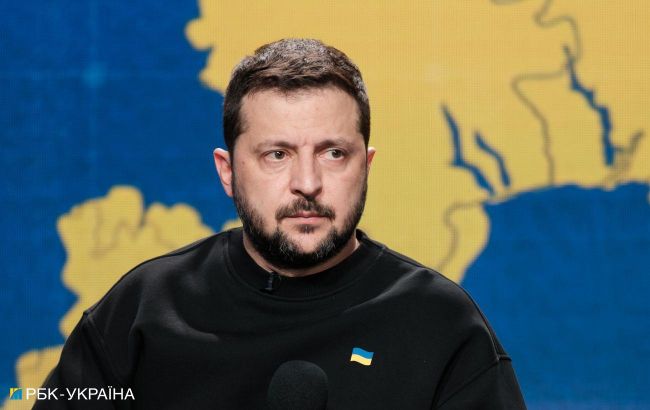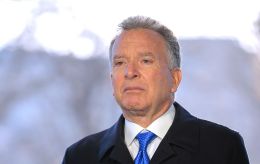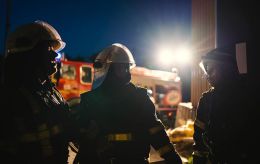What we know about Zelenskyy's victory plan and whether the war could end by this fall
 Photo: President Volodymyr Zelenskyy will present a victory plan to American partners in September (Vitalii Nosach/RBC-Ukraine)
Photo: President Volodymyr Zelenskyy will present a victory plan to American partners in September (Vitalii Nosach/RBC-Ukraine)
Two weeks ago, President Volodymyr Zelenskyy announced a victory plan for the Russia-Ukraine war. The exact details are unknown, but the initiative is set to be presented to American partners in September.
More details about the plan and whether the war might end by this fall you can find in the RBC-Ukraine article below.
Contents
- The victory plan is ready. Why it will be presented to Biden first
- "4+1". What is known about the victory plan and its points
- Is it realistic to end the war with Russia this fall?
The victory plan is ready. Why it will be presented to Biden first
At a press conference on August 27, Zelenskyy said the victory plan is ready but clarified that it will first be presented to US President Joe Biden. "The success of this plan depends on whether we get what is outlined in it, or if we are free to use what is included," Zelenskyy explained.
The plan will also be shown to candidates Kamala Harris and Donald Trump. These meetings are expected to take place during Zelenskyy's trip to the UN General Assembly in New York, whose next session began recently. Its central event will be the High-Level Week debate starting on September 24.
The key objective is to force Russia to end the war on terms fair to Ukraine. The details are not publicly available, although parts of the plan have been discussed with US congressmen at a forum in Italy.
This topic is particularly relevant to overseas partners. In the spring, when the multibillion-dollar aid package was approved, Biden was tasked with presenting a strategy for Ukraine's victory. Earlier this week, it became known that the White House sent a classified report to Congress.
Military and political expert of the Information Resistance Group Oleksandr Kovalenko believes the plan is connected to the 10 points of the peace formula, which have been shown multiple times before. The formula is broader because it takes into account the interests of both Ukraine and the world beyond its borders.
Regarding the victory plan, the first step is determining how realistic it is.
"Ukraine can work through the points, organize them. But most of them, in one way or another, depend on US support. That’s why these consultations are necessary," the expert explained.
According to him, if the plan involves forceful measures against Russia, it must be clarified whether allies will support this. The same applies to possible peace negotiations, diplomatic steps, financial sector, or counteroffensive actions on the front. "That's why it’s essential to present this plan directly to Joe Biden," Kovalenko added in a conversation with RBC-Ukraine.
"4+1". What is known about the victory plan and its points
According to Zelenskyy, the victory plan does not depend on whether Russia wants to end the war. "This plan does not rely on them. And here lies the choice of our partners. Either they agree for Ukraine to win, or they are not ready for our victory, just for deterring Putin," he said.
The president tentatively calls his initiative the "4+1" plan. It consists of four key points and one additional one for the post-war period.
One of the points aims to define Ukraine's strategic place in the global security structure. The second is a package to force Russia to end the war through negotiations. The third point is economic.
A significant element is a military operation in the Kursk region, and as Zelenskyy mentioned, "something has already been done" in this direction. He wants to present the victory plan based on successes on Russian territory.
What role does the Kursk operation play? It acts as a pressure factor, explains Kovalenko.
"Are the Russians redeploying troops there? Yes, a lot. This weakens them in the combat zone in Ukraine. It’s also a reputational blow. Now they are forced to reallocate resources to the Kursk region. Instead of trying to capture more in Ukraine, they are starting to defend their own territory," he noted.
The Kursk operation is also important because it affects Russia's unstable position. Furthermore, it suggests that there might be other operations in the future. "What if there’s a Bryansk operation? Belgorod? Or something more surprising? Anything can happen unexpectedly," the expert emphasized.
The fact that the enemy has launched a counteroffensive does not contradict the logic of the plan. Sooner or later, Russian forces would have done it, so the Ukrainian side was mentally and physically prepared. Zelenskyy himself confirmed this today. "The Russians have launched a counteroffensive. Everything is going on, but it is going on according to our, Ukrainian, plan," he said at a press conference with his Lithuanian counterpart, Gitanas Nausėda.
Is it realistic to end the war with Russia this fall?
A week earlier, at a Ramstein meeting, Zelenskyy urged allies to do everything to stop Russia's aggression in the coming months.
"Let’s make this fall a time for Russian aggression to fall – in a way that will end the war and restore a reliable international security order," he stated.
Later, the Spanish state agency EFE published an article saying that Zelenskyy’s victory plan aims to force Russia to stop the war this fall. The article also mentions preparations for a second Peace Summit, which is expected to take place by the end of the year. Unlike the first one, Russian representatives will be invited.
EFE wrote that as Zelenskyy and other Ukrainian officials had made clear, the goal of this second meeting was to put maximum pressure on Russia to accept peace on Kyiv’s terms.
According to Mykhailo Podolyak, adviser to the head of the President’s Office, the president is clear on what needs to be done. For example, in terms of military pressure, it is necessary to bring the war to Russian territory and scale it up. This requires a calculated number of appropriate tools.
In the economic aspect, Russia spends $200-300 billion annually on the war. It must be deprived of these resources, losing in the economy rather than actively selling gas, and oil, and building nuclear power plants abroad. The same applies to the diplomatic component. For instance, if China is interested in access to global markets, it should be convinced that access means responsibility under international law. If it wants to maintain this, it must pressure Russia.
"There are tools that, in my opinion, will lead to the following results. First, Russia will have fewer opportunities to finance the war. Today, it believes it is conducting an extremely expensive war but can 'wait it out'... until the beginning of some fictional negotiation process, which would mean that... 'we (the Russians - ed.) will take a long time to sign agreements, and in the meantime, prepare for the third stage of the war'," Podolyak told RBC-Ukraine.
Asked whether it is realistic to achieve this by this fall, he suggested that the approach should be to continue pressing Russia.
Oleksandr Kovalenko notes that on the one hand, Russia is already exhausted and cannot fight at the 2022-2023 level, but on the other, it is confident that it will hold onto the territories and may seize more. Therefore, it will not stop under Zelenskyy's conditions.
But, in his view, Russia can be forced to capitulate. "For this, something must happen, and it will not be through diplomacy. Perhaps the opening of a new front if allies step in for Ukraine. But this is an unrealistic plan," he stressed.
As for stopping the aggression by fall, it would require dealing such a blow to Russia in two and a half months that it would be unable to recover. However, it’s unlikely this can happen in the combat zone.
"This could be a breakthrough to Crimea, encircling a large number of troops on the left bank of the Kherson region, destroying logistics, and isolating the peninsula. This would cause real stress for Russia. There are various scenarios, but it’s hard to say which one might be used," Kovalenko believes.
The question is whether Ukraine is capable of such steps in the coming weeks. And given the 'genetic stubbornness' of the Russians, it is likely that even when they face total defeat, they will continue to stand their ground. In this sense, the victory plan tied to fall raises at least some skepticism.
Sources: statements by President Volodymyr Zelenskyy, an article by the Spanish EFE, and comments from military and political analyst Oleksandr Kovalenko and adviser to the head of the President’s Office Mykhailo Podolyak.

